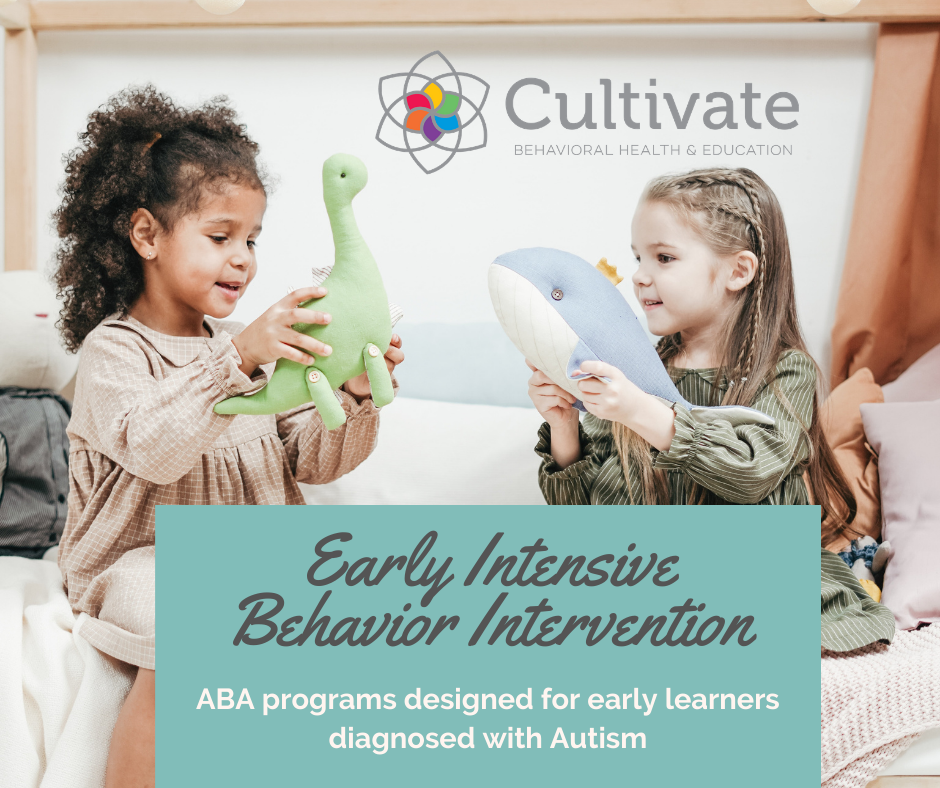Cultivate provides individualized ABA Therapy services to children and adolescents in their homes, our learning centers, and throughout our community. We incorporate a naturalistic approach to ABA and focus on making socially significant changes in the lives of every child and family we meet.
This means we celebrate autism and embrace the diversity it adds to our community. We are here to support each child in a way that gives them the tools to navigate the rest of their lives in a meaningful and independent manner.
We also aim to provide resources to better serve the entire family. In this post, we’re sharing the first in our ABC’s of ABA Therapy series. Explore a variety of free resources on our website including: blogs, parent trainings, ABA Funding guidance, and sensory craft activities on our social media.
The ABC’s of ABA Therapy

A is for Activities on Sensory Processing
Sensory processing is our brain’s ability to interpret stimuli from our environment. We gather information about our environment through the use of our senses: sight, sound, touch, taste, and smell. Activities for sensory processing are developed to stimulate these senses. Our Pinterest page is full of craft activities you can do with supplied from around your house!
B is for Books and Blogs on Autism Support
Let Cultivate be a resource to you and your family in the New Year. Click here to find the most popular and informational books on Autism.
Cultivate offers many free resources to the community, including parent trainings and support groups, guidance on insurance and diagnostic processes, and referrals to other community services through our Community Outreach team. Many of these resources are available on our website or through contacting your local Community Outreach Coordinator.


C is for Crisis Management
A crisis occurs when immediately available resources are not enough to de-escalate an unsafe behavioral situation. When a situation like this begins, changes to the environment and additional external support may be necessary.
As a parent with a child on the autism spectrum, the thought of Crisis Management may seem like a task too big to handle. Cultivate is here to help. A team of Registered Behavior Technicians in our Apprenticeship Program put together this informative presentation in our Parent Training series.
D is for Data Collection
Applied Behavior Analysis (ABA) is an evidence-based approach for creating significant positive behavior change. In our daily work, as clinicians we collect data on a variety of behaviors.
Learn more about the types of data our clinicians collect and how it’s used in ABA Therapy in our new blog: “Let’s Look at the Data!”
Above all, we keep in mind that we are working with and supporting an individual who is more than numbers and every individual’s path in unique.


E is for Early Intensive Behavior Intervention (EIBI)
Early Intensive Behavior Intervention (EIBI) are ABA programs designed for young children diagnosed with autism. They involve 20-40 hours per week of direct therapy. Children usually start these programs by the age of 3 and receive services for 2 or more years.
At Cultivate, our goal in our EIBI programs is to prepare children to transition into a more traditional school setting with minimal support. So, we focus on social skills, communication, and “learning to learn” skills like listening, transitioning and waiting!
Check out our Getting Started page to learn more.
F is for Family Services
Are you, or a someone you know, caring for a family member with an autism diagnosis? Join us every Thursday from 6:30-7:30 pm Central for our free virtual ASD parent and caregiver support group, hosted by Cultivate Behavioral Health and Education! This parent/caregiver support group is free and open to the community.
For more information, visit our Family Services page.

Where Your Child Learns Matters.
Our new website makes it easy to search on a national, state, or city level. Find the programs offered and accepted insurances at each clinic location. Helping you navigate the autism treatment journey. Fill out an intake form to start the conversation.


Recent Comments